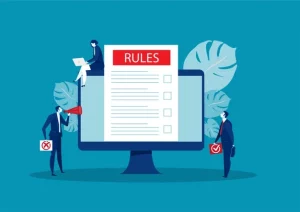Whether you’re an ambitious startup or an established enterprise, enforcing business rules manually doesn’t look like a good idea in 2023.
Instead, implementing a Business Rules Engine (BRE) or its more efficient version — a .NET rules engine is an effective way to streamline routine decision-making and improve your company’s overall productivity.
A Business Rules Engine, such as Code Effects, can help your business make more informed decisions and stay ahead of the competition.
In this article, we’ll dive into everything you might want to know about business rules engines and how they can benefit your company. So, let’s get down to business.
What is a Business Rules Engine?
A Business Rules Engine (BRE) is a software application that automates the execution of business logic. By providing a platform to fulfill a specific set of rules, a BRE significantly reduces manual data entry. It automates repetitive tasks, such as eligibility requirements and reporting.
With a Business Rules Engine, you can effortlessly define and automate responses to specific events or actions based on predefined and preloaded conditions. This robust tool is especially valuable for organizations handling complex business scenarios with multiple possible outcomes.
Why use a BRE?
The primary goal of a Business Rules Engine is to provide a systematic and efficient way of managing business rules that govern various aspects of an organization’s operations. In addition, businesses leverage Business Rules Engines to:
- Facilitate the automation of decision-making processes.
- Streamline operations.
- Improve compliance with regulations.
- Quickly respond to market changes.
- Have a centralized platform for storing and updating business rules.
- Reduce errors.
- Ensure a better customer experience.
How Business Rules Engines work
A Business Rules Engine is a software framework designed to implement predefined rules based on criteria such as company policies, goals, values, and other parameters.
Depending on its type, a BRE can use various rule representation formats, such as decision tables, decision trees, pseudo-natural language, or programming-like code.
Once the rules are set, the engine evaluates data from multiple sources — spreadsheets, databases, or other applications — and, based on this data, determines what action needs to be taken.
Types of Business Rules Engines
Business rules engines come in several types:
- Script-based rules engines. This type of engine requires using a programming language to define the rules. While script-based engines are ideal for simple logic, they aren’t suited to complex logic.
- Declarative rules engines. Declarative rules engines are more advanced engines commonly used in enterprise settings. They allow for more complex workflows with zero user intervention.
- Hybrid rules engines. A hybrid rules engine effectively combines the features of script-based and declarative engines. It offers both an easy-to-use graphical interface and a programmatic development capability.
- Rule-based rules engines. Engines of this type are user-friendly and can be used by non-technical staff. However, they’re not scalable and aren’t suitable for complex logic.
- Coding-based rules engines. These are best suited for complex logic but require programming skills to define and manage business rules.
BRE use cases
Business Rules Engines help organizations of any size and niche effectively manage their business rules, making this technology applicable to different cases. Below are some most common use cases for a BRE:
Dynamic Pricing
This pricing strategy allows businesses to offer the same product or service at different prices based on various circumstances. A classic example of dynamic pricing is changing ticket prices based on the number of seats left, demand, and time of the day.
Evaluating Credit Scores
Business Rules Engines can be used to analyze a customer’s credit history and use this data to approve or reject an application, set an interest rate, or determine a credit limit. This way, a BRE helps lenders automate the credit scoring process, making it more efficient and accurate.
Personalized Discounts
Offering personalized discounts is an effective strategy to retain customers and increase sales. Business Rules Engines help many companies to effectively manage discounts, offering customers specific discounts based on their purchase behavior and preferences.
Automated Insurance Underwriting
BREs are also becoming increasingly common in the insurance industry. They help automate the underwriting process by passing an insurance application for review only if the candidate fulfills the eligibility criteria.
Fraud Protection
Business Rules Engines help organizations quickly detect and respond to suspicious behavior by analyzing large amounts of data and identifying patterns and anomalies that may indicate fraudulent activity.
Benefits of using a Business Rules Engine

A Business Rules Engine can bring numerous benefits to a business, including:
- More efficient decision-making: by automating decision-making processes, a BRE helps companies to make faster, more accurate decisions.
- Increased efficiency: a Business Rules Engine streamlines routine decision-making, allowing your staff to focus on more critical activities.
- Greater customer satisfaction: a BRE can help organizations deliver more personalized customer service.
- Consistency: a Business Rules Engine goes a long way toward ensuring that each decision aligns with the organization’s goals and values, eliminating inconsistencies in decision-making.
- Staying compliant: a BRE can help you ensure that your business decisions comply with the relevant regulations and internal policies.
Final Thoughts
In today’s intensely competitive business environment, being ahead of the curve is crucial for success. A Business Rules Engine is a robust tool that can help businesses achieve this by bringing their operations to the next level.
Beyond automating decision-making processes, improving efficiency, and enhancing customer service, implementing a BRE is associated with a number of other benefits that allow businesses of all sizes to unlock new possibilities and achieve their full potential.






